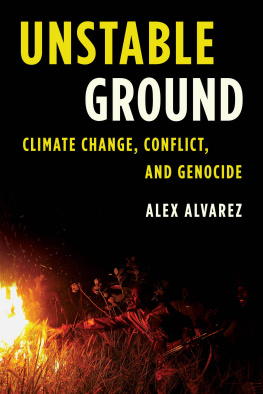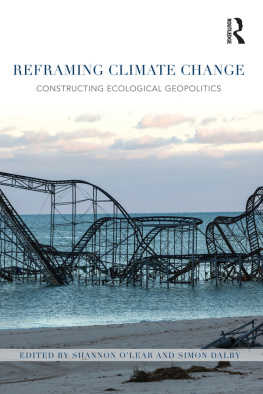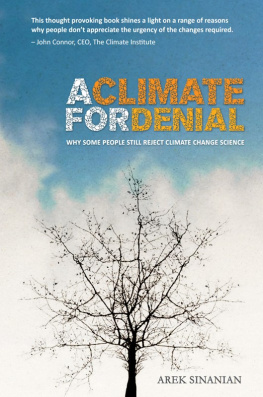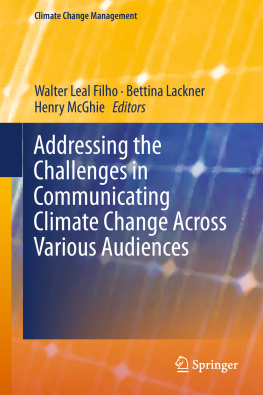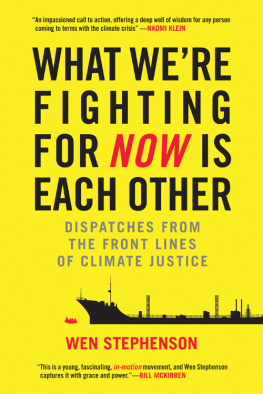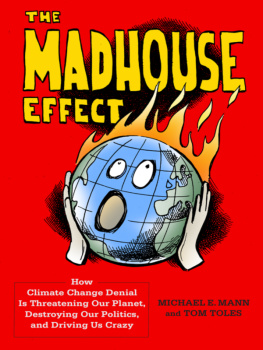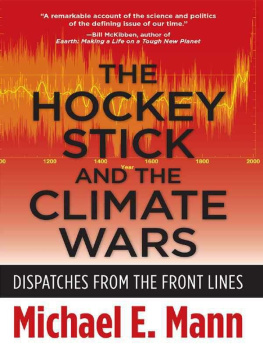Betting the Farm on a Drought
Stories from the Front Lines of Climate Change
SEAMUS McGRAW

University of Texas Press
Austin
Support for this book comes from an endowment for environmental studies made possible by generous contributions from Richard C. Bartlett, Susan Aspinall Block, and the National Endowment for the Humanities.
Copyright 2015 by Seamus McGraw
All rights reserved
First edition, 2015
Requests for permission to reproduce material from this work should be sent to:
Permissions
University of Texas Press
P.O. Box 7819
Austin, TX 78713-7819
http://utpress.utexas.edu/index.php/rp-form
LIBRARY OF CONGRESS CATALOGING-IN-PUBLICATION DATA
McGraw, Seamus, author.
Betting the farm on a drought : stories from the front lines of climate change / by Seamus McGraw. First edition.
pages cm
ISBN 978-0-292-75661-8 (hardback)
1. Climatic changesUnited StatesPopular works. I. Title.
QC903.2.U6M34 2015
363.738'740973dc23
2014027613
doi:10.7560/756618
ISBN: 978-1-4773-0382-5 (library e-book)
ISBN: 9781477303825 (individual e-book)
For my old man
Contents

My son, Liam, at the drill pad.
ONE
Sundance
IT HAD BEEN WEEKS SINCE I HAD BEEN THERE, and now, as my young son, Liam, and I rounded the corner of Ellsworth Hill Road near the edge of my family farm in my rattletrap old Chevy Blazer, it loomed into view, a massive cloud of dust and sand and diesel exhaust billowing up into the sky and all but blotting out the moon. Backlit by what must have been a hundred high-powered lights atop the seventy-foot-tall, hundred-yard-square Mayan pyramid the drillers had carved into our hillside, it looked as if some sort of bizarre rituala sacrifice, perhapswas playing out in front of us.
Maybe it was.
Two years earlier, Liam had been with me when we walked that ground with the surveyors for Chesapeake Appalachia, pacing out what they thought would be the perfect place to site the first of what they anticipated would be six mile-and-a-half-deep natural gas wells that would then snake out a mile and a half to suck out as much gas as they could from the Marcellus Shale beneath our little corner of northeastern Pennsylvania. The lead surveyor, a tall man with a deep-fried Texas accent, had tried his best to persuade my son to drive in the first stake, but when he offered the six-year-old boy the four-pound mallet, Liam hightailed it behind a blackberry bramble. A look of confusion and maybe a little bit of fear etched its way across my sons brow.
I glanced in the rearview mirror as I pulled into the long dirt driveway. I could see that look cross his face again. And then I glanced at my own reflection. The look was carved onto my brow, too.
Staring at this massive, churning industrial operation in what used to be my familys pasture, the place where as a boy I chased Angus cross cows on horseback pretending to be a cowboy, I listened to the otherworldly roar of the diesel engine that powered it all, the earth literally pulsing beneath me. I was surprised by my own feelings.
Id thought I was prepared for it. I had seen this operation beforethe military precision of the small army of roughnecks and technicians as they revved up the intimidating array of high-tech equipment, including the forty-foot-long battleship of a machine that would blast a toxic cocktail of water and sand containing up to a dozen chemicals, some of them kept secret even from the landowner, deep into the earth at more than 9,400 pounds of pressure per square inch to pry open tiny fissures in the rock and release the natural gas trapped inside it.
But now that it was happening here, on my land, I could understand my own sons wordless confusion. I could appreciate in a visceral way, maybe for the first time, why the word to describe this processfrackingstirs such fear. I could even feel the stirring of that fear myself.
Truth be told, that sense of unease had been gnawing at me for a while, ever since we had first signed the contract to allow the drillers onto our land. And while it was still unformed, it had taken on a kind of urgency the summer before, when I started out on the road to promote my last book, The End of Country, which detailed the difficult issues my family and my neighbors faced as we grappled with the question of whether to risk all we had and allow the drillers to bore their way into our lives.
In town after town, at college after college, every place I was invited to speak, I saw the deep fractures that this process had exacerbated. It was as polarized and polarizing an issue as any Ive ever encountered. But more than that, I came to see it as a kind of metaphor. It was, in miniature, a portrait of all the deep divisions that snake through our political and social discourse. It is no exaggeration to say that when talking to the vast majority of people I had met on the roadand there were a couple of thousand of themif I could tell where they stood on the issue of fracking, I could tell with an alarming degree of accuracy where they stood on a half dozen or so other contentious issues, from abortion and gun rights to the growing gulf between the haves and the have-nots in this country. Nowhere was that rift more jagged than on the question of the risks and possible responses to the changing climate, an issue that may be the most consequential of our time.
It is, of course, perfectly understandable that people tend to cluster in almost tribal groups when faced with issues that are so multifaceted and so complex, so full of nuance and uncertainty, every element of them fraught with both promise and peril. Hell, even scientists who spend their entire professional lives studying the risks associated with the changing climate admit that they sometimes have a hard time wrapping their minds around the magnitude of it all.
After all, insulated as we are, its no surprise that most harried Americans find little time to ponder the complex network that links their consumption of everything to the rising sea levels that threaten to erase from the map some South Pacific island nation theyve never heard of before. To a nation that for the most part knows polar bears only as furry computer-generated pitchmen who turn up on television between Thanksgiving and New Years to sell them Coca-Cola, the whole idea of melting ice caps is, to borrow a phrase used by New Jersey governor Chris Christie in the wake of Hurricane Sandy, a little esoteric.
Americans, who are by the millions treading water just trying to keep pace with their mortgages and their rising grocery bills, would rather not think about the issue at all. And if they are prodded to take a position, theyll likely take the one espoused by the coven of talking heads they usually trust, be it Fox News or MSNBC.
Nor is it any surprise that in the chaotic maelstrom that is modern media, only the most strident voices are heard above the din, and so when we manage to find any discussion about this at all, the few words we catch are the most divisive.
The tragedy of it is that across the whole cultural landscape of this country, all of those factors are conspiring to make the fractures deeper and wider. It has become almost clichd to say that the country is now more divided than it has been at any time since perhaps the Civil War, but the evidence of that, and the consequences of it, becomes clearer with each passing year.
Theres a line I often use when Im speaking: If the melting ice caps and the rising oceans dont get us, were all going to drown in the viscera of each others gored oxen.
Next page

